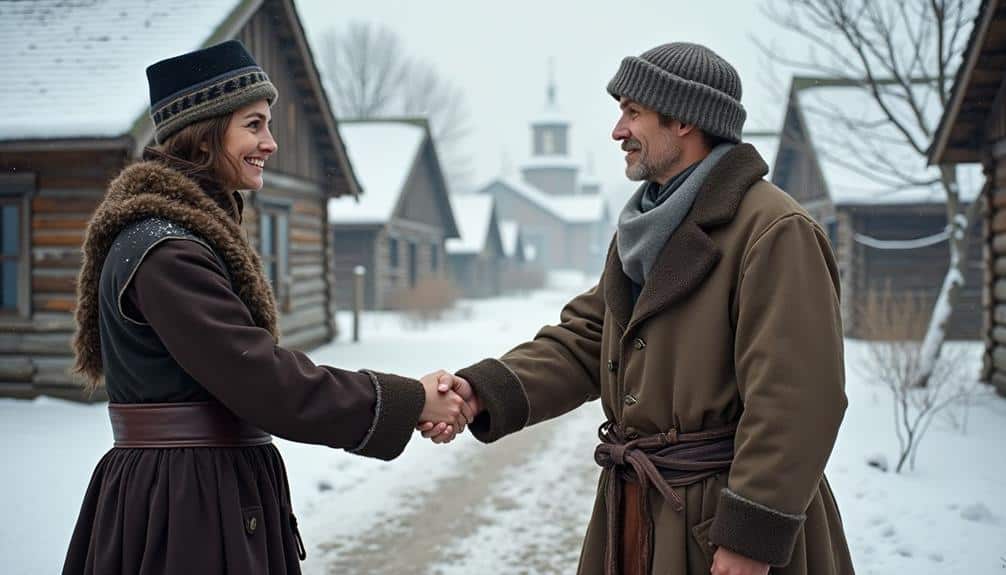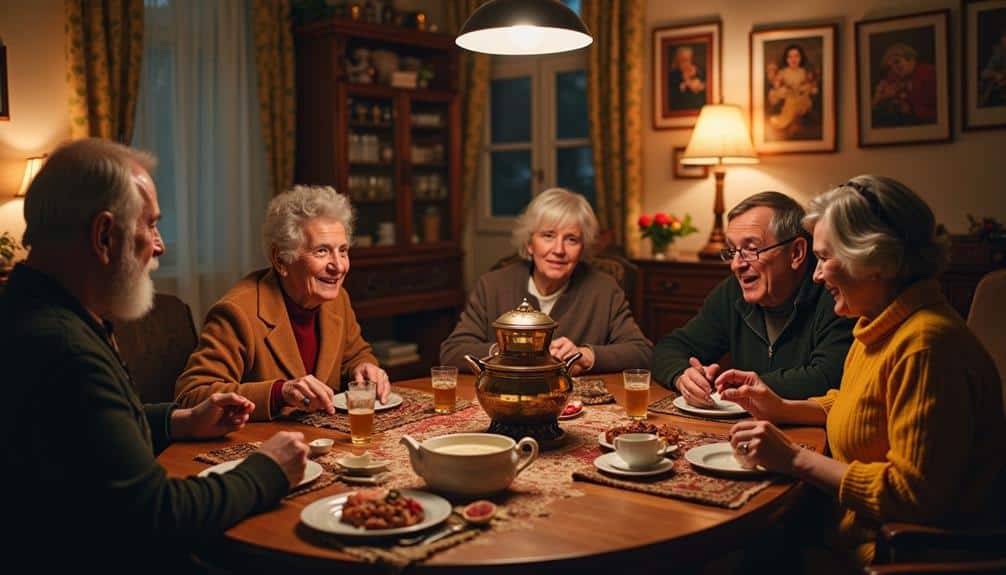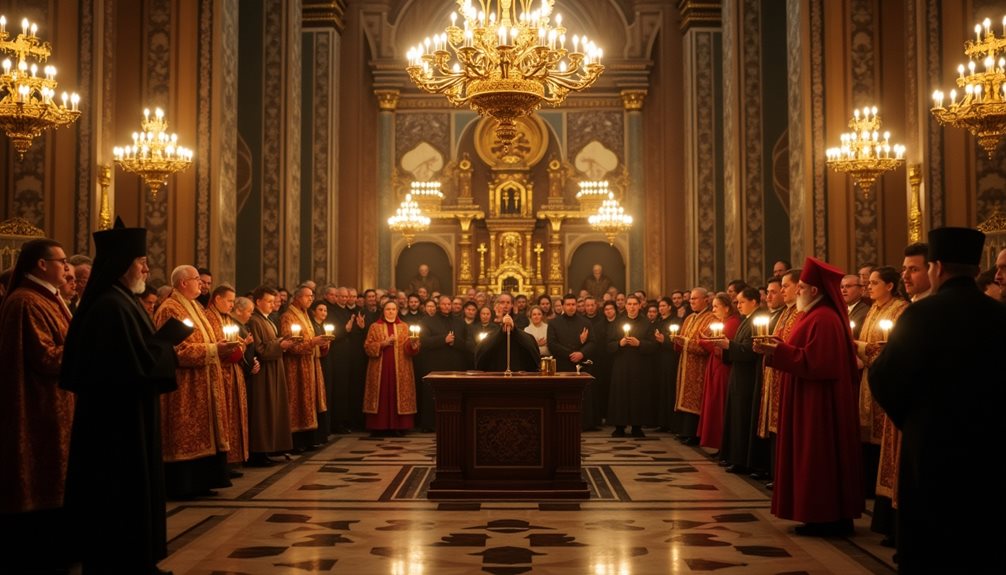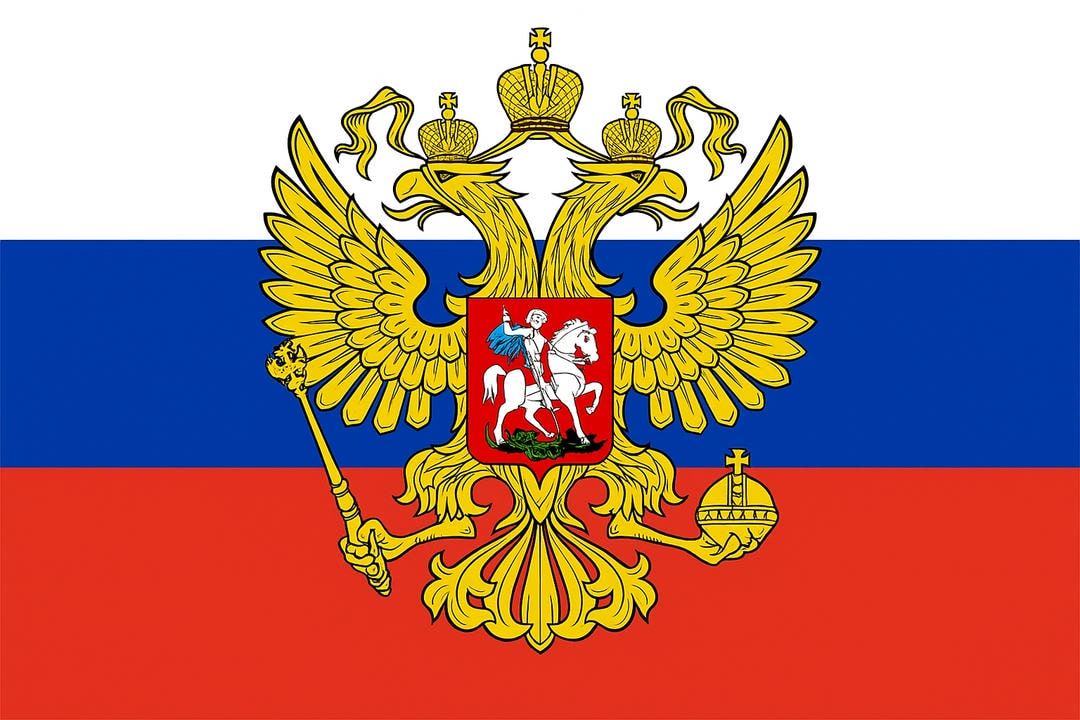Russian friendship and loyalty values are intricately woven into the nation’s cultural tapestry, with origins tracing back to communal living and strong family bonds. Trust and mutual support are essential, nurtured through genuine interactions and shared experiences. Celebrations of key life events further cement these connections, emphasizing emotional depth and resilience. Even in today’s digital age, traditional gatherings remain crucial, underscoring the timeless essence of these values. To understand how these principles manifest in contemporary Russian society and literature, one must explore their historical and social significance in greater detail.
Historical Roots of Loyalty

Loyalty has deep historical roots in Russian culture, tracing back to the early formation of the Russian state. The cultural influences that shaped these roots are manifold, ranging from the communal bonds of the ancient Slavic tribes to the societal expectations imposed by Tsarist autocracy.
Historical narratives often depict loyalty as a paramount virtue, necessary for survival in the harsh Russian climate and political landscape. This profound sense of loyalty manifests itself in various loyalty rituals that have evolved over centuries, reflecting the intricate trust dynamics within Russian society.
Friendship evolution in Russia cannot be separated from these historical contexts. The communal bonds formed in village communities, known as “obshchina,” laid the groundwork for collective responsibility and mutual trust. Such bonds were further reinforced by societal expectations, where personal loyalty was not only admired but often required.
The trust dynamics within these communities created a framework where loyalty was integral to social cohesion.
Regional variations also play a significant role in how loyalty is perceived and practiced across Russia. In some areas, the loyalty rituals may be more formalized, while in others, they might be expressed through everyday acts of kindness and support.
This diversity highlights the complex tapestry of loyalty in Russian culture.
Trust as a Cornerstone
Trust stands as a fundamental pillar in the landscape of Russian friendship and loyalty values. In Russian culture, the dynamics of trust are intricate and deeply ingrained, serving as a foundation upon which enduring relationships are built. Trust is not readily granted; it is earned through consistent actions and shared experiences that forge bonds of mutual respect and understanding.
One of the most telling aspects of trust dynamics in Russian friendships is the importance placed on sincerity and transparency. Friends engage in meaningful dialogues, where open communication and emotional honesty are revered. These conversations often form the bedrock of trust, allowing individuals to feel secure and valued within their social circles.
Friendship rituals in Russia further underscore the significance of trust. Common practices such as communal meals, heartfelt toasts, and the exchange of personal stories are not merely social niceties but are pivotal in reinforcing trust. These rituals act as reaffirmations of loyalty and commitment, solidifying the trust that underpins these relationships.
For those who value freedom and autonomy, understanding the centrality of trust within Russian friendships provides a window into a culture where relationships are treasured and nurtured with care and authenticity.
Role of Family Ties

In Russian culture, the role of family ties is paramount, shaping the very fabric of social interactions and friendships. The kinship dynamics inherent in Russian society underscore a deep-seated sense of loyalty and mutual support, where familial obligations often extend beyond the immediate family to include distant relatives. This interconnected network forms a crucial support system, emphasizing collective well-being over individual pursuits.
Familial obligations in Russia are not merely traditional customs but are deeply ingrained responsibilities that individuals feel toward their kin. These obligations manifest in various forms, such as providing financial assistance, emotional support, and participating in family gatherings. The expectation to uphold these duties fosters a sense of unity and reliability, elements that are highly valued in Russian friendships.
This interconnectedness often translates into how friendships are formed and maintained, with friends frequently being considered an extension of one’s family.
For an audience that values freedom, understanding these kinship dynamics provides insight into the collective mindset that governs Russian social interactions. While individual freedoms are cherished, the Russian emphasis on family ties illustrates how personal liberty can coexist with strong communal responsibilities, creating a balanced societal framework.
Celebrating Milestones Together
Marking significant life events is a cornerstone of Russian friendship and loyalty values, reflecting the deep emotional bonds that unite individuals. Shared experiences during festive celebrations serve as essential bonding activities, reinforcing the mutual support that characterizes strong relationships.
Whether celebrating birthdays, weddings, or other significant milestones, these joyful gatherings are filled with meaningful rituals that highlight collective achievements and foster a sense of belonging.
One of the most profound aspects of these commemorative events is the emphasis on mutual support. Friends and family come together, not merely as participants but as integral parts of each other’s lives, sharing in both the joy and the planning of these celebrations. This collective effort solidifies the sense of unity and reinforces the enduring nature of their connections.
The tradition of celebrating milestones together is deeply ingrained in Russian culture. These occasions often go beyond mere social gatherings; they are opportunities for individuals to express their loyalty and commitment to one another.
Support During Hard Times

When adversity strikes, the strength of Russian friendship and loyalty is profoundly evident. In moments of hardship, Russian bonds are fortified through a unique blend of emotional resilience and communal support. Friends and family come together, offering a robust network of assistance that embodies the true essence of solidarity and collective perseverance.
Emotional resilience plays a central role in steering through these challenging times. Russians are known for their stoic endurance and ability to remain steadfast under pressure. This resilience is not just an individual trait but a shared cultural value that influences the entire community. Friends and family members offer unwavering support, helping each other to weather life’s storms with grace and fortitude.
Communal support is equally critical in this dynamic. Neighbors, colleagues, and extended family members often extend their hands to those in need, ensuring no one faces difficulties alone. This collective effort fosters a sense of belonging and security, empowering individuals to feel free and supported within their social networks.
The intricate tapestry of Russian social relations consequently becomes a powerful source of strength, underscoring the profound impact of friendship and loyalty during tough times.
Social Gatherings and Traditions
Social gatherings and traditions form the bedrock of Russian cultural identity, offering a window into the values and customs that define the nation. Central to these gatherings are feasting traditions, where tables laden with diverse dishes symbolize abundance and hospitality.
Communal celebrations, whether marking a seasonal gathering like Maslenitsa or a significant life event, serve as pivotal moments for social bonding and shared experiences. Cultural rituals often accompany these events, reinforcing a sense of continuity and community.
Friendship toasts, a hallmark of Russian festivities, are more than mere formalities; they are heartfelt affirmations of trust and connection. These toasts, often accompanied by shared drinks, encapsulate the essence of Russian camaraderie and mutual respect.
Festive customs such as singing folk songs, dancing, and storytelling further enrich these gatherings, weaving a tapestry of collective memory and cultural pride. The importance placed on these social interactions underscores a deep-seated value of togetherness and loyalty, transcending individualism.
In a society that cherishes freedom, these traditions provide a sense of belonging and continuity, offering a profound understanding of the integral role that social gatherings play in nurturing and sustaining Russian friendship and loyalty values.
Loyalty in Russian Literature

In Russian literature, loyalty emerges as a profound and recurring theme, reflecting the nation’s complex social fabric and historical realities. This theme is intricately woven into the narrative fabric, often acting as a mirror to the multifaceted friendship dynamics that define human relationships.
Renowned authors such as Dostoevsky, Tolstoy, and Chekhov utilize loyalty not merely as a plot device but as a profound literary symbolism that probes into the moral and ethical complexities of their characters.
Dostoevsky’s “The Brothers Karamazov” explores loyalty through the bond among the Karamazov brothers, highlighting the tension between personal desires and familial obligations. Similarly, Tolstoy’s “War and Peace” intricately portrays the loyalty of characters like Prince Andrei and Pierre, whose friendships withstand the tribulations of war and personal upheaval.
Chekhov, in works like “The Cherry Orchard,” subtly examines loyalty within the context of social change and personal loss.
These literary explorations underscore the resilience and depth of loyalty in the face of adversity, resonating with readers who value personal freedom and integrity. Through the lens of Russian literature, loyalty transcends mere allegiance, transforming into a symbol of enduring human connection and ethical steadfastness.
Modern Expressions of Friendship
The evolution of friendship in modern Russian society reflects profound shifts shaped by historical, cultural, and technological influences. As digital advancements permeate daily life, digital friendships have emerged as a cornerstone of contemporary social interaction. Platforms like VKontakte and Telegram allow individuals to maintain connections across vast distances, fostering a sense of community that transcends geographic boundaries.
These virtual ties, however, often supplement rather than replace traditional friendship rituals that remain deeply ingrained in Russian culture. In-person gatherings, characterized by heartfelt toasts and shared meals, continue to be essential in cementing bonds. Despite the rise of digital communication, face-to-face interactions retain their significance, emphasizing the value placed on genuine, personal connection.
Celebrations of milestones and mutual support during adversity are manifestations of enduring friendship rituals that adapt to modern contexts without losing their essence. Moreover, the blending of digital and traditional modes of friendship illustrates the resilience and adaptability of Russian social values.
While technology offers new ways to connect, the core principles of loyalty and deep personal bonds persist, ensuring that friendships remain a foundational element of Russian society. This dynamic interplay between the old and new reflects a society that embraces change while honoring its rich cultural heritage.




